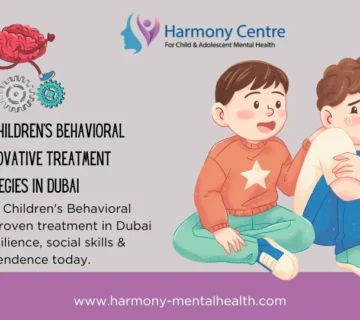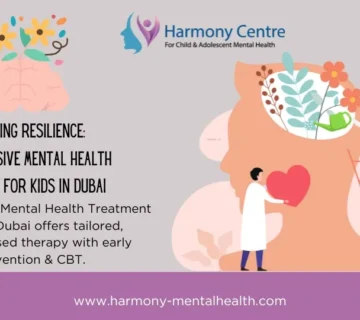Integrated Family and School-Based Therapy in Dubai: Building Resilient Support Systems for Child Mental Health

Discover integrated family and school-based therapy in Dubai for child mental health. Build resilient support systems with holistic care—book a free consultation now!
In today’s rapidly evolving world, a child’s mental health is influenced by both home and school environments. In Dubai and across the UAE, where families navigate dynamic cultural and academic challenges, fostering a supportive network is essential for a child’s well-being. At Harmony Centre, our integrated family and school-based therapy in Dubai for child mental health is designed to create resilient support systems that empower children to overcome emotional and behavioral challenges. Through a holistic, multidisciplinary approach, we bring together expert guidance for families and educators alike to nurture long-term growth, resilience, and success.
Our integrated approach ensures that every child receives the comprehensive care they need—combining evidence-based therapy, parental and school guidance, and continuous monitoring. By uniting professional insights from our experienced team of psychiatrists, clinical psychologists, occupational therapists, and other specialists with the active involvement of families and schools, we create an environment where children can thrive academically, socially, and emotionally.
Book a Free Consultation in Dubai Now to discover how our integrated therapy model can transform your child’s mental health and build a supportive community around them.
Contact Information
| Contact Method | Details |
|---|---|
| Phone | +971 (52) 8773268 / 04 558 2015 |
| Click Here | |
| info@harmony-mentalhealth.com | |
| Address | Office 409, Building Alrazi-64C, 26th St, Healthcare City, Duba |
The Critical Role of Family and School in Child Mental Health
Children’s development is a journey shaped by the interactions they have at home and in school. In a diverse and fast-paced city like Dubai, these environments can either be a source of strength or a significant stressor. Integrated family and school-based therapy recognizes that mental health challenges are not isolated to the individual—they ripple through the family unit and affect educational outcomes.
At Harmony Centre, we believe that optimal mental health care requires a collaborative effort between therapists, parents, and educators. Our integrated approach ensures that therapy is not confined to the clinic; rather, it extends into the child’s everyday life, reinforcing positive behaviors and effective coping strategies in every setting. By uniting evidence-based practices with real-world applications, we provide a holistic support system that adapts to the unique needs of each child.
Research by the Dubai Health Authority has demonstrated that early intervention and continuous support across home and school can lead to significant improvements in behavioral, emotional, and academic outcomes. This approach not only addresses immediate challenges but also builds resilience, setting the foundation for lifelong success.
Understanding Integrated Family and School-Based Therapy
Integrated family and school-based therapy is a comprehensive treatment model that combines two vital components of a child’s support network: family therapy and school-based interventions.
What Is Family Therapy?
Family therapy involves working with the entire family to improve communication, resolve conflicts, and create a nurturing home environment. This therapy helps parents understand their child’s needs and equips them with strategies to support behavioral changes and emotional well-being.
Key Elements of Family Therapy:
- Open Communication:
Facilitates honest discussions among family members to address underlying issues. - Conflict Resolution:
Provides tools for managing disagreements constructively, reducing household stress. - Parental Guidance:
Empowers parents with techniques to support their child’s development and reinforce positive behaviors at home. - Emotional Support:
Creates a safe space where each family member feels heard and valued.
What Is School-Based Therapy?
School-based therapy extends support into the academic environment. It involves collaboration with teachers, school counselors, and educational psychologists to create a structured, supportive framework that enhances a child’s learning and social interactions.
Key Elements of School-Based Therapy:
- Behavioral Support:
Implements strategies to manage disruptive behavior and promote positive classroom dynamics. - Academic Assistance:
Helps children overcome learning challenges by integrating tailored interventions into their school routines. - Peer Interaction:
Encourages healthy social interactions and builds essential communication skills. - Collaborative Planning:
Facilitates regular meetings between therapists, educators, and parents to align on strategies and monitor progress.
By integrating these two approaches, we ensure that interventions are consistent across the child’s primary environments, creating a unified support network that reinforces therapeutic gains and promotes holistic well-being.
The Harmony Centre Approach: How We Integrate Family and School-Based Therapy
At Harmony Centre, our integrated approach is designed to bridge the gap between home and school, ensuring that every aspect of a child’s life supports their mental health. Our multidisciplinary team collaborates closely to deliver a seamless therapeutic experience that is both compassionate and effective.
Key Components of Our Approach
- Comprehensive Assessments:
We begin with thorough evaluations that include clinical assessments, interviews with parents, and input from teachers. This process identifies the child’s strengths, challenges, and the specific dynamics within the family and school environments. - Customized Treatment Plans:
Based on the assessment, our team develops an individualized plan that combines family counseling with school-based interventions. This plan is tailored to address the child’s unique needs, whether it’s improving social skills, managing anxiety, or enhancing academic performance. - Collaborative Sessions:
Our therapists facilitate sessions that include both family members and school representatives. These sessions create a platform for discussing challenges, setting shared goals, and developing consistent strategies for behavior management. - Ongoing Monitoring and Support:
Regular follow-ups and progress reviews ensure that the treatment plan remains effective and is adjusted as needed. Continuous feedback from both home and school environments helps maintain a cohesive approach. - Training and Resources for Parents and Educators:
We provide workshops, guidance, and resource materials to help parents and teachers implement effective strategies. This empowerment fosters a supportive environment that extends beyond therapy sessions.
How It Works in Practice
Imagine a child who struggles with anxiety and disruptive behavior in the classroom. In our integrated model, the first step is to conduct a detailed assessment involving the child, their parents, and their teachers. The insights gathered help us understand the triggers at home and in school.
Next, our team creates a tailored plan that might include family counseling sessions to improve communication and emotional support at home, coupled with school-based strategies to manage behavior and enhance academic engagement. Regular joint sessions ensure that everyone involved is on the same page, and adjustments are made based on the child’s progress. This unified approach not only alleviates the child’s immediate symptoms but also equips them with the tools to manage future challenges effectively.
Book a Free Consultation in Dubai Now to experience the transformative power of integrated family and school-based therapy at Harmony Centre.
Benefits and Measurable Outcomes
The integrated approach to mental health care offers numerous benefits, which are evident through measurable outcomes and success stories from families across Dubai, Abu Dhabi, Sharjah, and the broader UAE.
Key Benefits
- Enhanced Communication and Understanding:
By involving the entire family and school community, children learn to express themselves more clearly, and adults become better equipped to support them. - Improved Behavior and Academic Performance:
Consistent strategies across home and school help reduce disruptive behavior and improve focus, leading to better academic outcomes. - Increased Emotional Resilience:
A supportive network fosters emotional stability, enabling children to cope better with stress and anxiety. - Cost-Effective, Sustainable Care:
Integrated therapy is not only effective but also a cost-efficient solution compared to fragmented approaches. The long-term benefits of improved mental health can reduce the need for more intensive interventions later on. - Stronger Support Systems:
Families and educators develop a shared understanding and work collaboratively to reinforce positive behaviors, creating an environment that supports continuous growth.
Measurable Outcomes
Studies and internal assessments have shown that integrated therapy can result in a 30–50% improvement in behavioral outcomes and academic performance over a six‑month period. Families who participate in our integrated programs report:
- Significant Reduction in Anxiety:
Children exhibit improved emotional regulation and reduced anxiety in both home and school settings. - Enhanced Social Skills:
Increased peer interaction and better communication skills are commonly observed. - Positive Academic Feedback:
Teachers note higher levels of engagement and improved classroom behavior.
These outcomes underscore the efficacy of our integrated approach, demonstrating tangible benefits that resonate with families and schools throughout the UAE.
Practical Strategies for Implementation at Home and School
Success in integrated family and school-based therapy depends on consistent application of therapeutic strategies beyond the clinical setting. Here are practical tips for parents and educators to reinforce therapy outcomes:
For Parents
- Establish a Consistent Routine:
Create a structured daily schedule that includes time for homework, leisure, and family interactions. Consistency helps reduce anxiety and provides a predictable environment. - Encourage Open Communication:
Foster an environment where your child feels comfortable expressing their feelings. Regular family meetings or one-on-one conversations can help reinforce positive communication. - Implement Behavioral Reinforcement:
Use positive reinforcement to reward good behavior. This could be as simple as verbal praise, small rewards, or additional playtime. - Engage in Joint Activities:
Participate in activities that promote teamwork and emotional expression, such as family art projects or cooperative games. - Monitor and Reflect:
Keep a journal to track your child’s progress and note any behavioral changes. Share these observations with therapists and educators to ensure consistency.
For Educators
- Create a Supportive Classroom Environment:
Implement clear rules and structured routines that help manage behavior and reduce anxiety. Positive classroom management techniques can make a significant difference. - Promote Peer Interaction:
Encourage group activities and collaborative projects that foster social skills and teamwork. - Maintain Open Lines of Communication:
Regularly update parents on classroom behavior and academic progress. A collaborative approach between school and home can reinforce therapeutic strategies. - Provide Individualized Support:
Recognize that every child is unique. Offer additional support or adjustments for students who may be struggling to integrate into the classroom environment. - Utilize Feedback:
Actively seek feedback from therapists and parents to adjust teaching strategies and create a cohesive support system for the child.
These practical strategies ensure that the benefits of integrated therapy extend into everyday life, reinforcing progress and fostering a supportive community around the child.
Family & School-Based Therapy – FAQs
Final Thoughts About Integrated Family and School-Based Therapy in Dubai
Integrated family and school-based therapy is a powerful approach to supporting child mental health in Dubai and throughout the UAE. By creating a cohesive support system that unites families and educators, Harmony Centre delivers holistic care that empowers children to overcome challenges and thrive in every aspect of their lives.
Our evidence-based model, combined with practical strategies for implementation and continuous collaboration, ensures that therapy extends beyond the clinic and into the daily lives of our young clients. With measurable outcomes, real-life success stories, and a commitment to cultural sensitivity, our integrated approach sets the foundation for long-term mental wellness.
If you’re ready to build a resilient support system for your child and transform their mental health, Book a Free Consultation in Dubai Now. Let Harmony Centre’s experienced team guide you on the path to a brighter, healthier future for your child.
For further information and additional mental health resources, please visit the Dubai Health Authority website. Embrace integrated therapy today and create a nurturing environment that fosters growth, resilience, and success for your child.
👉 Book a Consultation Now: Call +971 4 558 2015 or visit www.harmony-mentalhealth.com.
Join our online community and stay updated with our latest events, articles about Transforming Child Mental Health Dubai


